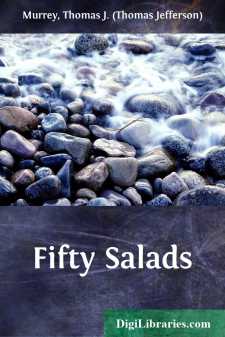Categories
- Antiques & Collectibles 13
- Architecture 36
- Art 48
- Bibles 22
- Biography & Autobiography 813
- Body, Mind & Spirit 142
- Business & Economics 28
- Children's Books 17
- Children's Fiction 14
- Computers 4
- Cooking 94
- Crafts & Hobbies 4
- Drama 346
- Education 46
- Family & Relationships 57
- Fiction 11829
- Games 19
- Gardening 17
- Health & Fitness 34
- History 1377
- House & Home 1
- Humor 147
- Juvenile Fiction 1873
- Juvenile Nonfiction 202
- Language Arts & Disciplines 88
- Law 16
- Literary Collections 686
- Literary Criticism 179
- Mathematics 13
- Medical 41
- Music 40
- Nature 179
- Non-Classifiable 1768
- Performing Arts 7
- Periodicals 1453
- Philosophy 64
- Photography 2
- Poetry 896
- Political Science 203
- Psychology 42
- Reference 154
- Religion 513
- Science 126
- Self-Help 84
- Social Science 81
- Sports & Recreation 34
- Study Aids 3
- Technology & Engineering 59
- Transportation 23
- Travel 463
- True Crime 29
Fifty Salads
Description:
Excerpt
REMARKS ON SALADS.
Of the many varieties of food daily consumed, none are more important than a salad, rightly compounded. And there is nothing more exasperating than an inferior one. The salad is the Prince of the Menu, and although a dinner be perfect in every other detail except the salad, the affair will be voted a failure if that be poor. It is therefore necessary for those contemplating dinner-giving, to personally overlook the preparation of the salad if they wish favorable criticism.
To become a perfect salad-maker, do not attempt too much at first; practise on plain salads and plain dressings before you try combination salads, fancy dressings, and elaborate garnishings, and you will soon become proficient in the art. Do not prepare plain salads until the moment they are wanted at table. Should they be mixed long before they are served, you will find the lettuce flabby and the dressing watery and insipid.
The importance of using none but the purest condiments must not be overlooked, for a perfect salad cannot be made with inferior ingredients. Garnishing or decorating salads presents an opportunity for displaying artistic taste and judgment. The most deliciously blended salad will not be appreciated unless it is attractive in appearance. No exact rule can be laid down for garnishing; much depends on the judgment and good taste of the salad maker. Original ideas are commendable. Wild flowers neatly arranged with alternate tufts of green are very pretty during warm weather. During cold weather garnish with pretty designs cut from beets, turnips, radishes, celery, etc.
Borage for Salads.—This is an excellent ingredient in nearly all vegetable salads. Cover a champagne-bottle with raw cotton or heavy, coarse flannel; fasten it with thread; set the bottle in a soup-plate, and pour warm water over it. Soak a handful of borage seeds in warm water for fifteen minutes; drain, and work them into the flannel around the bottle, as evenly as possible. Place the bottle and soup-plate in a warm, dark place until the seeds sprout; then bring it to the light. Keep water in the plate constantly. When the shoots are a few inches long, trim them off, as wanted, and add them to any salad with a plain dressing.
Plain Salad Dressing is admissible with nearly all salads. It is composed of oil, vinegar, pepper, and salt, and nothing else. Many who do not care particularly for oil, use equal quantities of oil and vinegar, others one-third vinegar to two-thirds oil; these proportions satisfy a large class, but four parts of oil to one of vinegar are about the right proportions, provided the vinegar is of the best.
The plain dressing is made in two ways, either mixed in a bowl and the salad added to it, or as follows: Take a tablespoon and put in it (holding it over the salad) one saltspoonful of salt, one-fourth this quantity of freshly ground pepper, and a tablespoonful of oil; mix and add to the salad. Add three more tablespoonfuls of oil; toss the salad lightly for a few seconds; lastly, add a tablespoonful of sharp vinegar; toss the salad again, and serve....














